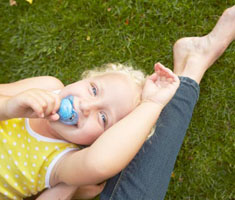The first Mash
stages of life > 0-6 Months
![[Translate to South Africa:] the first mash for your baby](/fileadmin/Default/help_and_advice/0-6_months/0_6_first_mash.jpg)
By now, your infant should have blossomed into a chubby, thriving baby. And whether you are still breastfeeding or not, your baby’s increased nutrient and energy needs will gradually call for more than milk alone. At some stage between 5 to 7 months it will be time to introduce baby’s first solids. Weaning your baby any earlier than this is not only unnecessary but also unwise, as it will only increase the risk of allergies. Younger infants will also be incapable of handling a spoon.
However, from 5 months onwards your child should be able to eat finely pureed solids. Start off gently with a few small spoons of mashed vegetable (such as pureed carrots) before your baby’s regular milk feed. But don’t be irritated if he spits it straight back out and starts crying. The pureed carrot feels and tastes different to milk and also needs to be eaten differently. Lots of babies love this new experience, but some don’t. Just wait a few days and try again.
Once your baby takes to this new form of feeding, you can begin to replace his milk feeds on a month-by-month basis. Start, for example, with a vegetable, potato and meat mixture, then give him a whole milk and cereal porridge in the evening and finally, a cereal and fruit porridge at lunchtime.
If you want to cook your baby’s food yourself, take care when choosing the ingredients. When buying pre-prepared jars, it’s always worth looking carefully at the list of ingredients too – even if the print is tiny. One other important thing: your baby needs to drink as well as eat. This will help the food go down better and will aid digestion. Appropriate drinks to offer him are water, unsugared baby tea or strongly-diluted, unsugared fruit juice.

![[Translate to South Africa:] baby's first mash](/fileadmin/Default/help_and_advice/0-6_months/NUK_0-6_stage.jpg)



